Bill Hirsch Bridged Buddhism of East and West
Written by: George Draffan
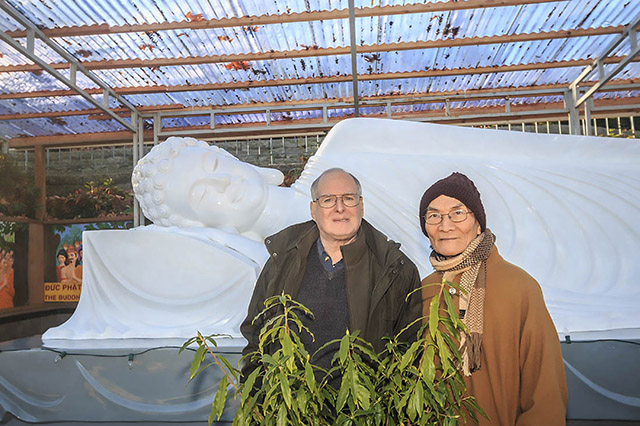
Bill Hirsch and Master Nguyen Kim in front of the reclining Buddha statue at Co Lam Pagoda in Seattle.
Photos by: Yvette Cardozo, George Draffan, Chen Si (Epoch Times), Tim Tapping, Steve Wilhelm
Rev. Bill Hirsch (小白云 Xiaobaiyun), a unique link between the Northwest’s Western and Asian Buddhist communities, is remembered well for his great contributions to the dharma.
He died more than a year ago, in November, 2020. He is survived by his wife Yvette Cardoza.

Profile photo from Bill’s White Cloud Buddhism website.
Hirsch lived without a pituitary from his early 20s; doctors told him he probably wouldn’t make it past 40. Fortunately for Bill’s family and friends, and for the greater Buddhist community, he lived to 83.
Family, friends, and colleagues held a memorial for Hirsch in 2021, after delays due to the covid pandemic.
Hirsch’s commitment to Buddhism crossed multiple traditions. He was ordained as a Theravada monk in Thailand in 1964. He was a pioneer Buddhist chaplain from the 1980s on, and was often called to support Asian immigrants in hospitals, or families at funerals.
In 1990 Hirsch ordained as a priest of the White Cloud Buddhist Society, a Chinese Mahayana philosophical school known as the Flower Garland (Hua Yen) lineage. Fluent in Vietnamese, Bill translated poems written by his friend Thích Nguyên Kim. Here’s one of those poems, in an article Bill wrote about Kim.
Here’s a taste of Bill’s teachings on emptiness, in an article he wrote for the White Cloud website.
Over many years Hirsch repeatedly was a key figure in festivals and meetings bringing together Western and Asian Buddhist communities. He for years served on the board of directors of Northwest Dharma Association, and one person who remembers him well from that era is former association Administrator Timothy O’Brien.
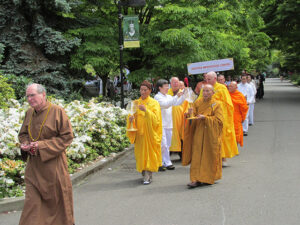
Hirsch leading a 2013 Vesakha procession through the Seattle University campus, followed by monks from Chua Co Lam and Seattle Meditation Center.
“I had known Bill for a long time. He had been one of the most important long-term supporters of the Northwest Dharma Association,” O’Brien wrote. “His contribution was always subtle. He did not voice his opinion loudly. He seemed to hold himself mindfully back. But when he did speak it was always to the point. His contribution was immeasurable.”
In 2005 Hirsch became one of the first certified minister’s assistants at the Seattle Betsuin Buddhist Temple. Former Minister Don Castro recalls:
“He was one of our initial minister’s assistants in a trial program in the 1990s, and taught and conducted services for us before moving on to the Seattle University EcoSangha program, and Northwest Dharma Association.
“My wife Shuri, who was a chaplain at Swedish, remembers Bill helping out the Chinese, Korean and Vietnamese patients by making CDs of their native Buddhist chants for the Swedish Spiritual Care Department. Copies were made and distributed to the Issaquah, Ballard and Cherry Hill campuses, and are still available.
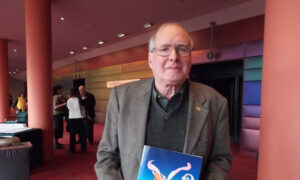
Hirsch enjoying the 2014 Shen Yun Performing Arts dance at McCaw Hall at the University of Washington, in Seattle.
“I remember Bill’s travelling to our Yakima Buddhist Temple and conducting a service which was attended by a young Mexican-American woman for the first time. Today, she is one of the leaders of the temple. She told me it was due to Bill’s clear explanation of Buddhism that she became a Buddhist and joined the temple. He was particularly articulate about the Buddhist teaching of emptiness. He was deeply committed, humble, and had a wonderful sense of humor and irony.”
Hirsch served as a teacher and organizer of visiting teachers and programs for the EcoSangha at Seattle University.
“Bill was a dear friend and companion in the whole-hearted negotiation of the Buddha Way,” wrote EcoSangha Co-Director Tetsuzen Jason Wirth. “For over a decade he helped me co-direct the Seattle University EcoSangha, including regular sittings, a lecture series, a two-day symposium on Buddhist ecology, and an annual sesshin. He shared the depth of his practice with us through regular dharma talks. In his works and being, the luminous generosity of the Buddha heart was powerfully present.
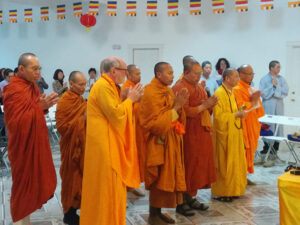
Refuges and precepts led by Hirsch and assembled monastics at the 2016 Vesakha ceremony at Duoc Su Buddhist Cultural Center in Seattle.
“His wisdom, generosity, and compassion helped shape the shared practice that we enjoy today. Bill was a Bodhisattva who left the world better than he found it, although we grieve a world without him. May he rest in power.”
Hirsch’s deep contacts in the Asian community made him an important link for “Northwest Dharma News.”
“He was for years of inestimable help in compiling Northwest Dharma News,” wrote Northwest Dharma News Editor Steve Wilhelm. “Bill was a key source about happenings in the Asian temple community, and used to offer a few good tips for nearly every issue.
“This was important, because one of our missions is to help bring the Western and Asian dharma communities in closer contact and harmony. Always it was a delight to hear from him, with the surprising tips he’d offer. Always I marveled at how deeply tied to the Asian dharma sector he was, and so trusted.
“Always I appreciated how respected he was by Asian monastics in the region. I remember the Vesak celebration at Seattle University many years ago, and how Bill led the procession of monastics with great certitude and presence, around the campus.”
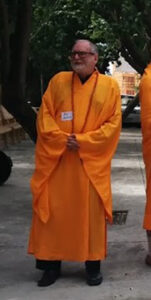
Bill Hirsch participating in Vesak ceremonies at the Chu Duoc Su Temple in Seattle in 2016.
Hirsch’s wife Yvette Cardoza recalled his early life, in an obituary she wrote for the Society of American Travel Writers:
“Bill was born August 1, 1937, accidently in Toronto. His parents were fishing on Georgian Bay when his mother unexpectedly went into labor. And though he was born in a Toronto hospital, his birth certificate (well, it was a somewhat paranoid era and his father was a lawyer) showed him being born in Cleveland, Ohio, which is where he grew up.
“Bill played clarinet with the Cleveland Orchestra at 16. His musical talent included relative pitch, but his clarinet career ended abruptly when a horse knocked out his front teeth while he was working at a racetrack.
He planned to go to Oberlin College and study composing, but instead, his parents decided to move to Miami after he graduated high school and he went to the University of Miami. Later he moved to New York City, where he got a political science degree at the New School.”
Several careers later in 1981, Hirsch met Cardoza at a Mensa party and they married the next year. They became members of the Society of American Travel Writers, and in the stories they wrote together Hirsch focused on research and information and Cardoza concentrated on color and photography.
Seattle Betsuin Buddhist Assistant Minister Irene Goto recalls that Hirsch and Cardoza were inseparable:
“Bill and I drove to Wapato from Seattle on a first Sunday of March to help with Yakima Buddhist Church’s annual Sukiyaki Fundraiser. I remember being the driver and Bill was on the phone several times on our journey. He must have called Yvette four times during the 2 ½ hour-drive giving her a blow-by-blow on the weather, pass condition, and the beauty of the landscape.
“I thought, ‘What a special friendship they have to be so in-touch, even while apart!’ Bill must have been especially grateful for the cell phone.”
Timothy O’Brien remembers Hirsch’s superpower in choosing Asian restaurants, for a lunch series with “codgers,” who had worked around Northwest Dharma Association for many years.
“For a number of years before his death, we met once a month or so at a restaurant he suggested. The range was tremendous. He taught me how to eat authentic dim sum. He took me to the foremost Sichuan restaurant in the city. He took me to upscale Vietnamese restaurants where he ordered in Vietnamese things that were not even on the menu,” O’Brien said.
“During these remarkable luncheons, I had a chance to learn about his amazing background: how he had served for the State Department in North Vietnam before the war, and therefore knew how to speak Vietnamese with a North Vietnamese accent; how he had come to be ordained in a Chinese esoteric sect. I learned how he and Yvette had been able to travel the world together.
“To say that Bill Hirsch was a remarkable person is an understatement. I wish I could have one more lunch with him.”
Additional remembrances of Hirsch are published on the NWDA blog.
George Draffan is a volunteer for the Northwest Dharma Association, having served as executive director and on the board of directors. His day job is landscaping in Seattle.
